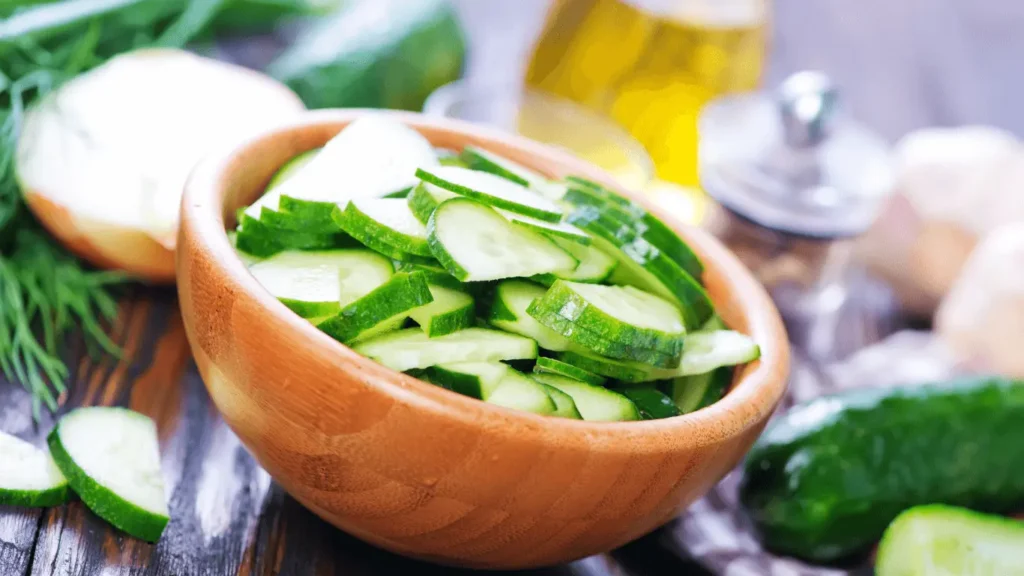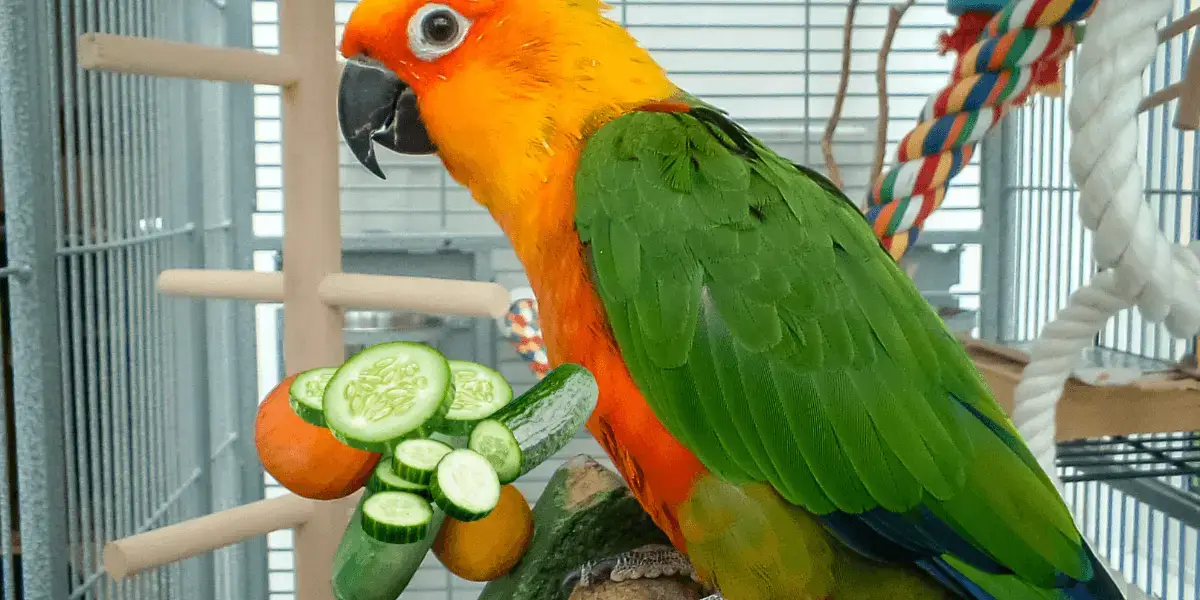Your parrot can eat anything chewable if it is so hungry that it looks like it hasn’t eaten in days. But should it eat anything? No. So, what approximately cucumber? Can Conures Eat Cucumbers? Yes, you can feed parrots cucumber but make beyond any doubt the cucumber is natural. The issue with the items we discover in grocery stores is that they are altered to be enticing. It’s not the best for you or the parrot.
Table of Contents
Nutritional Value of Cucumbers

Presently, let’s conversation almost cucumbers – those green, watery delights! But some time recently you begin hurling them to your conure, let’s look into their dietary playbook.
Overview of Cucumber Nutrition:
Cucumbers are like the hydrating superheroes of veggies. They’re moo in calories, tall in water substance, and stuffed with vitamins K and C. Furthermore, they bring a reviving crunch to the table. But hold on, not all cucumbers are made to break even. Pick the standard ones; skip the salted or prepared ones for your birdie buddy.
Vitamins and Minerals Found in Cucumbers:
Why ought your conure care about vitamins and minerals? Well, they’re the building pieces for a sound life. Vitamin K makes a difference with blood clotting, and Vitamin C boosts the safe framework. Cucumbers provide these treats in a flawless, green package.
Potential Wellbeing Benefits for Conures:
So, what’s in it for your feathered companion? Cucumbers can be a hydrating nibble, particularly on hotter days. The water substance makes a difference keep your conure cool and might indeed contribute to their feathered fabulousness. Fairly keep in mind, that control is key – as well much of anything can lead to a bellyache.
Understanding Conure Nutrition
Recently, let’s get into the nitty-gritty of what makes a conure’s paunch cheerful. Your feathered companion isn’t fair a charming confront; they require a well-rounded count of calories to remain in tip-top shape. Think of it like a superhero slim down – full of supplements for a fowl that can take off through the skies!
General Dietary Requirements:
First off, each conure needs a blend of seeds, natural products, veggies, and pellets. It’s like a colorful serving of mixed greens party for them! Make adjustments to the parcels so they get a bit of everything.
Importance of an Adjusted Diet:
Why the adjustment, you inquire? Well, it’s all around keeping your birdie buddy solid and energized. A blend of supplements makes a difference with plume well-being, resistant framework boost, and in general chirpiness.
Common Foods in a Conure’s Diet:
What’s on the menu? Seeds, like sunflower and safflower, are a hit. Include a few natural products – apples, berries, and bananas are as a rule crowd-pleasers. Veggies like carrots and verdant greens include that additional crunch.
Preparing Cucumbers for Conures
Presently we’ve got the lowdown on cucumbers, let’s step into the kitchen and plan these green treats for your conure. It’s not fair almost cutting and dicing – there’s a bird-friendly way to do it!
- Safe Cucumber Varieties for Birds:
Not all cucumbers are made rise to in the birdie world. Adhere to the standard, unwaxed cucumbers you discover in your basic supply store. Say no to pickles or those prepared ones – they might have things that don’t sit well with your chirpy pal. - Proper Washing and Arrangement Techniques:
Before your conure takes a snack, deliver those cucumbers a great flush. Keep in mind, that feathered creatures are touchy to pesticides, so it’s astute to go natural if you can. Once they’re squeaky clean, cut them into reasonable, bite-sized pieces. This makes it simpler for your conure to appreciate without feeling overwhelmed. - Recommended Serving Sizes:
Hold your steeds! Sometime recently you unleash the cucumber feast, begin little. Offer a modest piece to begin with and see how your conure responds. If they allow it a chirpy thumbs up, you can steadily increment the parcel. But hello, not every winged creature will be a cucumber fan, and that’s affirmed. Each feathered creature has its interesting taste buds!
Potential Risks and Concerns
- Overfeeding and Digestive Issues: While cucumbers are solid, overloading can lead to stomach-related issues such as runs. It’s pivotal to offer cucumbers in balance and guarantee an adjusted diet.
- Pesticide Residue Concerns: Cucumbers can have pesticide buildup on their skin, which can be hurtful to conures. Continuously wash cucumbers completely or select natural cucumbers to minimize this risk.
- Allergic Reactions: Although uncommon, a few conures may have an unfavorably susceptible response to cucumbers. Side effects may incorporate tingling, swelling, or respiratory issues. If you take note of any of these signs, halt bolstering cucumbers and look for veterinary counsel.
FAQs
What are the food things that I should not feed my parrot?
You should avoid feeding your parrots food from the alliums family such as onion, garlic, shallot; liquor, chocolates, caffeine, refreshments, garbage nourishment, avocado and pits of other natural products, fish, meat, handled nourishment, and dairy products.
What food should I allow to my parrot have diarrhea?
You should bolster them with vegetables that are rich in vitamins and supplements. Verdant vegetables, fiber-rich foods, and seeds can be given to the parrot. You ought to maintain a strategic distance from giving them spoiled, rotten, or ruined nourishment. Too, you ought to maintain a strategic distance from giving them natural products for a whereas or restrain the amount.
Is it Okay to Feed Conures with Cucumber Seeds?
Cucumber seeds however are not toxic to conures and can be given in small quantities. Nevertheless, the elimination of these foods can help in the prevention of choking as well as other digestive complications.
Conclusion
Therefore, cucumbers can be a healthy and refreshing snack for conures as long as it is prepared and fed to the bird the right way. As long as they are presented in moderation, always washed thoroughly, and cut into suitable sizes, cucumbers should be appropriate for the consumer’s consumption. It is always wise to observe the bird’s response to the new foods and seek veterinary help.

Abubakr is a passionate parrot enthusiast based in Pakistan. He shares his life with his vibrant parrot, Peto, and is dedicated to understanding parrot nutrition, behavior, and training. Through his experiences with Peto, Abubakr aims to gain a deeper insight into the needs and personalities of parrots and to share his knowledge with fellow parrot lovers. With a focus on the nutrition of conures, Abubakr is excited to connect with like-minded individuals and learn from their experiences.
